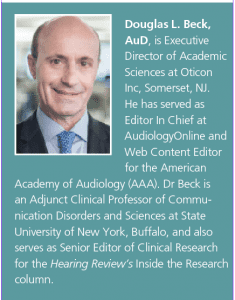Inside the Research | September 2018 Hearing Review
Grant Searchfield is an associate professor of audiology and director of the Hearing and Tinnitus Clinic at the University of Auckland, New Zealand. Dr Searchfield is one of the world’s leading experts on the cognitive processes involved in tinnitus perception and innovative technology for the management of hearing loss and tinnitus. In addition to tinnitus research, he is involved in the study of the neurological basis of multisensory integration and accessible hearing technologies. Along with his research and many important papers on tinnitus, he is also an associate editor for the International Journal of Audiology, Journal of the American Academy of Audiology, and Scientific Reports.
With tinnitus and hyperacusis being the subjects of so many interesting new research papers and books, we thought it would be an excellent time to catch up with Dr Searchfield.
Beck: Hi Grant! Thanks for taking time to speak with me about tinnitus and related matters!
Searchfield: Thanks Doug. Honored to work with you, too!
Beck: Grant, let’s jump right into your thoughts about the origins of tinnitus.
Searchfield: OK, well, for many decades we’ve all been looking for the singular physiological basis for tinnitus. There may be an as-of-yet unknown physiologic basis for tinnitus, but it is also possible that the origins of tinnitus may be unique in each person who perceives it.
Beck: Agreed, and it seems to me a frequently occurring precursor to tinnitus is emotional and/or psychological stress. Now having said that, I do believe hearing loss and noise exposure matters, as well as one’s general health—all of these are potential contributory factors. But I suspect stress may be a reasonably common factor, and, if so, we’re less likely to find a shared anatomic or physiologic anomaly.
Searchfield: I agree it’s not likely tinnitus originates from one single thing. Every patient is unique. In fact, when we observe tinnitus patients through functional magnetic resonance imaging (fMRI), it’s remarkably difficult to look at the scans and say who does or does not have tinnitus! It takes an awful lot of people to even find marginal similarities and differences across people with and without tinnitus.
I also agree emotions and stress matter. We’ve done studies in which we’ve exposed people to positive or negative auditory and visual stimuli, and the negative auditory stimuli do make the tinnitus worse. Further, in veterans, we know that extreme stress combined with noise exposure and trauma represent, more or less, a perfect storm from which one may start to perceive unrelenting or catastrophic tinnitus.
Beck: And what about the timing, or the correlation between perceiving tinnitus and the actual insult itself?
Searchfield: That varies across people. We know that, for some people, they perceive tinnitus immediately upon the onset of the trauma or insult. However, for others, it may not be perceived for days, weeks, months, or years, and of course, as you’ve written, Doug, many people experience the sound of tinnitus without suffering from it.1
Beck: Excellent point. We estimate that about 15% of the US population—or about 50 million people—perceive tinnitus, or might respond “yes” if you were to ask if they hear ringing noises in their ears now and then. Yet, of those 50 million, probably only 5 to 8%—or 2 to 4 million people—might identify it as a significant factor from which they actively seek relief. So, in other words, one might say we have 3 to 4 million people who are the actual or potential “tinnitus patients.”
Searchfield: Right. The variation in the perception, origin, etiology, and annoyance level is vast, and not easily characterized. In New Zealand, we ran quite a large study on the prevalence, and our percentages are similar. We estimate that about 6.5% of adults might be annoyed by tinnitus in midlife, and that seems to rise to about 14% of the population over age 65.
Beck: And I would suspect that, often, the people who complain about tinnitus are indeed noticing tinnitus; it’s there and they can perceive it. However, the reason it is significant for them may be that they have substantial and/or undiagnosed hearing loss, which they simply cannot hear! That is, they can hear their tinnitus, but they cannot hear their hearing loss.
Assuming that’s the situation, the stress related to not hearing clearly, and not being able to easily participate in conversations—and perhaps the reality of social isolation (a common effect of hearing loss)—allows one to blame and focus more on the tinnitus, when in reality, the problem is stemming from undiagnosed and/or untreated hearing loss.
Searchfield: We have often found that to be the case. It is remarkably difficult for many people to identify whether the culprit is their tinnitus or their hearing loss. Many people have come into the clinic complaining about tinnitus, but once we do our evaluation it becomes clear that their hearing loss is the primary issue.
On the other hand, some people certainly do suffer significantly from their tinnitus. So it can be argued that our first goal is to perform a complete audiometric evaluation in order to identify where the problem is. We need to find out whether the primary issue is tinnitus, or if it is their hearing loss which can create stress and perhaps exacerbate their tinnitus.
Beck: I recall James Henry, PhD, making the same point in 2017 regarding the difficulty patients have in isolating and identifying hearing loss versus tinnitus.2 In fact, Dr Henry and his colleagues developed the Tinnitus and Hearing Survey3 to help sort it all out, and I agree: it makes good sense to complete a thorough audiometric evaluation on each tinnitus patient.
Searchfield: Yes, absolutely. The key to being a successful clinician is understanding what the needs and goals of the patient are. Once you know their needs and goals, the professional can create and implement a management plan—customized to that individual—to meet their objectives.
Beck: What other tools do you use to help obtain subjective information to document the patient’s tinnitus perception? I generally use the Tinnitus Handicap Inventory (THI),4,5 although there are many other useful tools, too. The point is, we should determine the degree of distress the patient is experiencing, and I believe it is not enough to say “the patient reports her tinnitus is mild.” Our task is to figure out what they’re experiencing and quantify it as best we can.
Searchfield: We use the Client Oriented Scale of Intervention (COSI) that we revised a bit to be used for the tinnitus patient (and we’ve added a “T” for tinnitus). The COSIT6 helps us solidify complaints and focus on specific, measurable and patient-oriented goals.Again, each patient is unique and we need to know what their specific issues are. Once we know what the management goals are, we engage our Sound Therapy and Aural Rehabilitation for Tinnitus (START) program.7 The START program is less of a specific protocol than it is a framework, or menu, of therapy options to begin addressing the individual’s specific needs.
Beck: Grant, I wonder if you can describe the most challenging tinnitus patients?
Searchfield: The patients who are among the most difficult, or treatment resistant, are those with anxiety problems. They are so tightly wound, and so worried, that it is often extremely difficult to succeed with them—although it can be done, given patience and time. But, as you know, the patient has to be open to change, too, or the opportunity for success is quite limited. Therefore, working within a multi-disciplinary approach is highly beneficial, as it may be appropriate to refer to a psychologist to address the anxiety.
Beck: I usually recommend working with a psychologist who is familiar with tinnitus,8 and one who also offers cognitive behavioral therapy (CBT), as CBT seems to be the most successful approach to tinnitus, based on the peer-reviewed literature.
Searchfield: Yes, I think CBT is usually very useful. But even in those referred cases, the audiologist may wish to maintain the position as the primary professional contact or the case leader for the patient.
Beck: Let’s talk a little about why the audiologist should be the case manager for tinnitus patients using the multiple benefits of sound therapy, delivered through hearing aids. When I write or lecture on this topic, I like to point out the “80/80 rule,” which is that some 80% of tinnitus patients have hearing loss, and some 80% of people with hearing loss have tinnitus. The correlation between tinnitus and hearing loss is high, but certainly not one-to-one. So when people ask me why not send all tinnitus patients to a psychologist for CBT, my answer is that, if the stress from their hearing loss contributed to their perception of tinnitus, 80% of the referred patients would still have hearing loss and communication difficulty, even if the psychologist helps them manage their stress. If we send all tinnitus patients to a psychologist (or other mental health care provider), the primary problem—namely hearing loss—would not be managed; only the secondary stress would be addressed.
Searchfield: I follow that line of reasoning and I agree; it makes sense.
Beck: Thanks Grant. The other point I like to make is that sound therapy via hearing aids does address the primary problem for 80% of the people with tinnitus who likely have hearing loss, and perhaps just as likely for those with normal hearing, too. Once the patient can effectively and easily communicate, it seems likely their communication-related stress would be reduced. Also, note that hearing aids can help the patient hear speech and listen more easily, can reduce tinnitus intrusiveness, can help the patient habituate to new sounds, can distract the patient from their tinnitus, and may trigger neuroplasticity in the brain of the tinnitus patient. The last point was recently covered in an excellent article by Tutaj et al9 in the May/June Ear and Hearing.
I’d like to get your thoughts on the article in that edition from Beukes and colleagues titled “Audiologist-Guided Internet-Based CBT for Adults with Tinnitus in the UK.”10
Searchfield: I thought it was an excellent paper. They used a crossover design in which they compared a control to Internet-based CBT (iCBT). The authors concluded that the iCBT resulted in a statistically significant greater reduction in their tinnitus compared to the control. The iCBT also reduced co-morbidities, such as insomnia, depression, hyperacusis, and cognitive failures. So these results may quickly open some additional new protocols and avenues for the tinnitus patient and the hearing care professional.
A few years ago, we created www.TinnitusTunes.com to provide tinnitus resources for clinicians and enable 24/7 patient access to rehabilitation tools and background sounds. The online clinical resources in 2018 are substantial and increasing.
Beck: Thanks Grant. It’s been a joy speaking with you. I am very appreciative of your knowledge and time.
I also want to call out to readers that the chapter you wrote with Caroline Selvaratnam titled “Hearing Aids for Decreased Sound Tolerance and Minimal Hearing Loss: Gain Without Pain”11 is eye-opening, offers reasonable solutions, and addresses the primary fears and concerns of the hyperacusis patient. The chapter can be found in the new book by Marc Fagelson and David Baguley, Hyperacusis and Disorders of Sound Intolerance (Plural Publishing, 2018). It’s very clever, and I urge our colleagues addressing and managing hyperacusis to read this excellent chapter.
Searchfield: Thanks Doug. It’s been a lot of fun, and thanks for your comments, input, and tinnitus knowledge, too.
Correspondence can be addressed to Dr Beck at: [email protected]
Original citation for this article: Beck, DL. Tinnitus, CBT, iCBT, and tinnitus management: An interview with Grant Searchfield, PhD. Hearing Review. 2018;25(9):40-42.
References
-
Mazevski A, Beck DL, Paxton C. Tinnitus Issues and Management: 2017. Hearing Review. 2017;24(7):30-36.
-
Beck DL. Progressive tinnitus management, habituation, and more: An interview with James A. Henry, PhD. Hearing Review. 2017;24(5):38-40.
-
Henry JA, Griest S, Zaugg TL, et al. Tinnitus and hearing survey: A screening tool to differentiate bothersome tinnitus from hearing difficulties. Am J Audiol.2015;24:66-77.
-
Newman CW, Jacobson GP, Spitzer JB. Development of the Tinnitus Handicap Inventory. Arch Otolaryngol Head Neck Surg. 1996;122(2):143-148.
-
Tinnitus Handicap Inventory (THI). American Tinnitus Association (ATA) website. https://www.ata.org/sites/default/files/Tinnitus_Handicap_Inventory.pdf
-
Searchfield GD. A Client Oriented Scale of Improvement in tinnitus for therapy goal planning and assessing outcomes. JAAA. DOI: https://doi.org/10.3766/jaaa.17119
-
Searchfield GD, Linford T, Durai M. Sound therapy and aural rehabilitation for tinnitus: A person centred therapy framework based on an ecological model of tinnitus. Disabil Rehabil. 2018. DOI:10.1080/09638288.2018.1451928
-
Harvey MA. How to refer patients successfully to mental health professionals. Hearing Review. July 2, 2008. https://hearingreview.com/2008/07/how-to-refer-patients-successfully-to-mental-health-professionals/
-
Tutaj L, Hoare DJ, Sereda M. Combined amplification and sound generation for tinnitus: A scoping review. Ear Hear. 2018;39(3):412-422.
-
Beukes EW, Baguley DM, Allen PM, Manchaiah V, Andersson G. Audiologist-guided internet-based cognitive behavior therapy for adults with tinnitus in the United Kingdom: A randomized controlled trial. Ear Hear. 2018;39(3):423-433.
-
Searchfield GD, Selvaratnam C. Hearing aids for decreased sound tolerance and minimal hearing loss: Gain without pain. In: Fagelson M, Baguley DM, eds. Hyperacusis and Disorders of Sound Intolerance: Clinical and Research Perspectives. San Diego, CA: Plural Publishing;2018.






